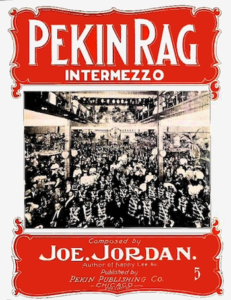
Promotional Flyer
*The Pekin Theatre was established on this date in 1905. Located in Chicago, Illinois, it was one of the first Black-owned musical and vaudeville stock theatres in the United States.
Between 1905 and 1911, the Pekin Club and its Pekin Theatre served as a training ground and showcase for Black theatrical talent, vaudeville acts, and musical comedies. Additionally, the theatre allowed “Black theatre artists with an opportunity to master theater craft and contribute significantly to developing an emerging Black theater tradition.” The Pekin became "renowned for its all-Black stock company and school for actors, an orchestra able to play ragtime and opera with equal talent, and a repertoire of original musical comedies."
Robert T. Motts founded the theatre following a 1901 trip to the Parisian music hall, “Café Chantant.” Motts, a Chicago saloon keeper and gambling king, was inspired to “contribute to his race by providing entertainment along more cultural and uplifting lines.” In 1905, he converted his Pekin saloon and restaurant at the corner of 27th and State Street into the Pekin Theatre “Temple of Music.”
Following a fire in 1906, Motts renovated the entire building, increasing the capacity from 400 to 1200, including box and lodge seating. With its “stock company of colored artists, original musical comedies, farces, and plays written and composed by colored men," the ‘New Pekin Theatre’ re-opened on March 31, 1906, with the first production of the musical The Man from 'Bam.
The Pekin Theatre became the "only theatre in America playing colored artists exclusively" at a time when “most whites believed that Blacks possessed little or no skill in theater management.” In all, the Pekin Theatre’s all-Black staff of 18 included a press agent, treasurer, house physician, and acting troupe, the Pekin Stock Co., with 34 members. Among the numerous actors, playwrights, and directors who contributed to Pekin’s enormous popularity were Charles Sidney Gilpin, Jesse A. Shipp Sr., Harrison Stewart, Lottie Grady, and J. Ed Green. Despite a decline in the overall interest in vaudeville and stock theatre, and a rise in the competition from white-owned theaters in Bronzeville, Chicago, the Pekin continued to thrive under Mott's ownership until his passing in 1911.
According to J. Hockley Smiley of the Chicago Defender, "no other funeral in the memory of the writer has brought out such a vast crowd of people as that of Mr. Motts." Following his passing, the Pekin remained in the Motts' estate before being sold to various owners over the next decade, never fully reclaiming its prominent position. By 1910, over 53 Black-owned and operated Theatres across the United States, including seven theatres named after Robert T. Motts' New Pekin Theatre.